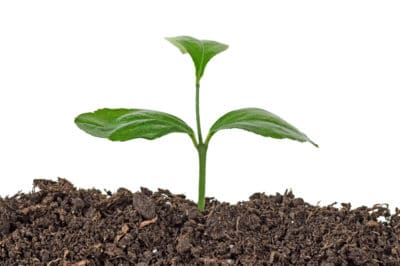What Do I Need to Get Started?
To get started, you need:
- The seeds from an organic lemon. Non-organic lemon seeds don’t germinate reliably.)
- Distilled water
- Chamomile flower tea
- A bowl of clean water
Expert gardener’s tip: Most varieties of lemons come true from seed, meaning they inherit the traits of the trees that produced the seeds they grew from. Meyer lemons are the exception if you plant their seeds, the resulting trees may not be what you expect.
How Do I Prepare the Seeds?
To reduce the risk of your germinating seeds succumbing to damping off fungus, brew a cup of chamomile flower tea using distilled water. Let it cool before soaking your seeds in it for 24 hours. The tea’s high sulfur content is a great fungicide.
The soaked seeds will develop a layer of germ-friendly gel. To remove it before planting, swish them lightly for 1 minute a bowl of clean, cool water. Keep the seeds moist while you prepare their starter pots.
How Do I Plant the Seeds?
For this part of the seed starting project, you need:
- Sterile seed starter mix
- Clean bowl
- Water
- One 4-inch seed starter pot with drainage holes for each seed
- Pencil with eraser
- Clear plastic wrap
- Rubber bands
- Pour your seed starter mix into a clean bowl and mix water in a little at a time until it’s moist throughout, but not saturated.
- Fill each starter pot to within ½ inch of the rim with the moist growing medium.
- Make a ½-inch deep hole in the center of each pot with the eraser end of the pencil.
- Set one seed — pointed end down — in each hole and cover it with medium.
- Stretch a piece clear plastic wrap over each pot and secure it with a rubber band.
- Poke seven or eight small holes in each piece of plastic with the pencil tip.
- Move the pots to a bright location (out of direct sun) with a temperature between 68° and 72°F (20° to 22.2°C).
Condensation on the perforated plastic covers should keep the growing medium moist. If it’s drying out, remove the cover long enough to mist the medium lightly with a spray bottle.
When Will the Seeds Sprout?
Lemon tree seeds normally need one to three weeks to germinate. Each viable one sprouts a stalk with two primitive leaves (cotyledons). When the first true leaves appear, fertilize with an organic, water-soluble houseplant fertilizer at the label’s recommended strength.
Reapply the fertilizer every two weeks and water whenever the growing medium looks and feels dry.
When Do I Transplant the Seedlings?
When they have three sets of true leaves, transplant your lemon seedlings to 6-inch pots filled with moist citrus potting mix. Water until water runs from the drainage holes and keep them in the same warm, sunny location.
What Care Will the Seedlings Need?
In their first year, give your seedlings eight or more hours of daily sun. If necessary, move them outdoors when nighttime temperatures are consistently above 60°F (15.5°C). Continue watering when the citrus mix feels and looks dry and fertilize every two months during the growing season.
When you see roots poking through the drainage holes, move the seedlings to 10-inch pots. Don’t be alarmed to see thorns sprouting as they grow; they’re a natural defense against leaf-munching critters.
Prune the central stalks when the seedlings get leggy and move the pots back indoors before your first fall frost. Use grow lights, if needed, to supplement their winter sun.
Expert gardener’s tip: Be patient in waiting for your seed-started trees to flower and bear fruit. In the meantime, appreciate them as a lovely, glossy-leaved patio plants and indoor air cleaners.
